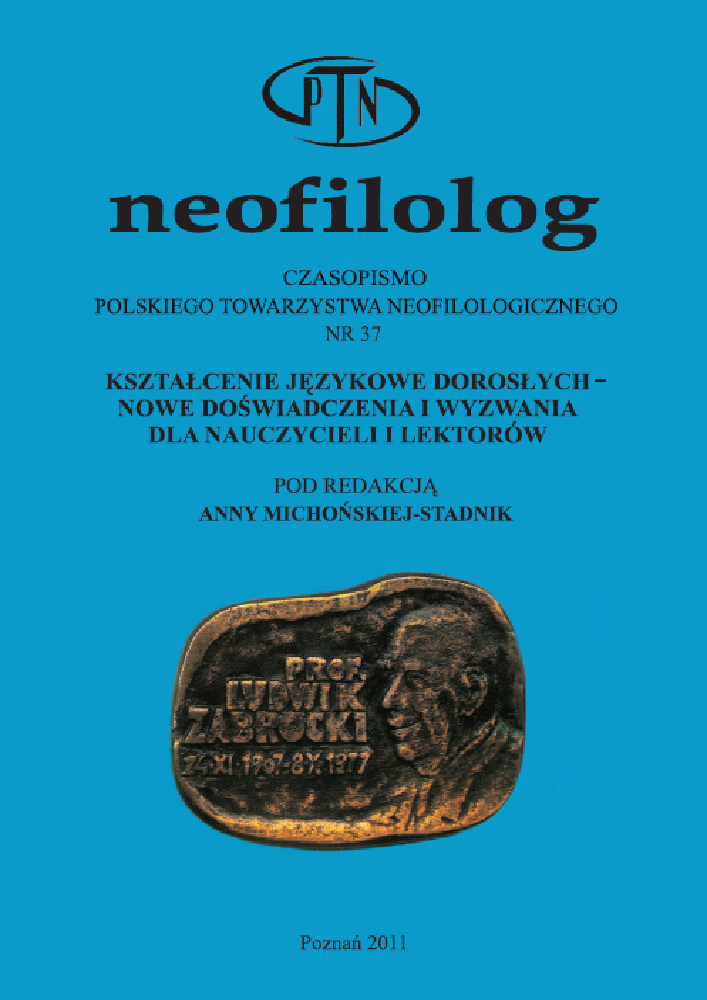Abstract
The present paper attempts to investigate causes of poor lexical compe-tence of prospective students of modern philology. The focus is placed on the techniques and cognitive strategies selected by such students in learning lexis.
References
Aguado, K. 2004. „Evaluation fremdsprachlicher Wortschatzkompetenz: Funk-tionen, Prinzipien, Charakteristika, Desiderate”. Fremdsprachen Lehren und Lernen 33: 231-250.
Beile, W. 1988. „Übungen und Üben im fremdsprachlichen Lernprozeß”. Der Fremdsprachliche Unterricht 92: 4-7.
Bimmel, P./Rampillon, U. 2000 Lernerautonomie und Lernstrategien. Berlin/München: Lanenscheidt
Bohn, R. 1999. Probleme der Wortschatzarbeit. Berlin: Langenscheidt.
Bohn, R./Schreiter, I. 2001.„Arbeit an lexikalischen Kenntnissen.” (w:) Einfüh-rung in die Didaktik des Unterrichts Deutsch als Fremdsprache. Band I. (red. G Henrici i C. Riemer). Baltmannsweiler: Schneider Verlag: 166-201.
De Florio-Hansen, I. 2004. „Wortschatzerwerb und Wortschatzlernen von Fremdsprachenstudierenden. Erste Ergebnisse einer empirischen Unter-suchung”. Fremdsprachen Lehren und Lernen 33: 83-113.
De Florio-Hansen, I. 2006. „Vom Umgang mit Wörtern. Ergebnisse einer schriftlichen Befragung von Fremdsprachenstudierenden”. (w:) Wortschatz und Fremdsprachenlernen. (red. D. Siepmann) Verlag Empirische Pädagogik: Landau: 145-191.
Desselman, G. i Hellmich, H. 1986. Didaktik des Fremdsprachenunterrichts (Deutsch als Fremdsprache). Leipzig: Verlag Enzyklopädie.
Nation, I. S. P., 1990. Teaching & Learning Vocabulary. New York: Newbury House.
Löschmann, M. 1993. Effiziente Wortschatzarbeit. Alte und neue Wege. Frankfurt am Main: Peter Lang.
Pawlak, M. 2008. „Autonomia w nauce języka angielskiego w liceum – diagnoza, analiza, wnioski”. (w:) Autonomia w nauce języka obcego – co osiągnęliśmy i do-kąd zmierzamy. (red. M. Pawlak). Wydawnictwo Państwowej Wyższej Szkoły Zawodowej: Konin: 137-157.
Richards, J.-C. 1976. „The role of vocabulary teaching”. TESOL Quarterly 10. 77-89.
Scherfer, P. 2007. „Wortschatzübungen”, (w:) Handbuch Fremdsprachenunterricht. 5. wyd. (red. K.-R., Bausch, H. Christ, i H.-J. Krumm) Tübingen und Basel: Francke: 280-283.
Targońska, J. 2011. „Lexikalische Kompetenz. Ein Plädoyer für eine breitere Auffas-sung des Begriffs”. Glottodidactica XXXVII: 117-127.
Tschirner, E. 2004. „Der Wortschatzstand von Studierenden zu Beginn ihres Anglistikstudiums.” Fremdsprachen Lehren und Lernen, 33: 114-127.
Wilczyńska, W. 1999. Uczyć się być nauczanym? O autonomii w przyswajaniu języka obcego. Warszawa-Poznań: Wydawnictwo Naukowe PWN.
License
Copyright (c) 1970 Joanna Targońska

This work is licensed under a Creative Commons Attribution-NoDerivatives 4.0 International License.
Authors
Authors of texts accepted for publication in Neofilolog are required to complete, sign and return to the Editorial team’s office the Agreement for granting a royalty-free license to works with a commitment to grant a CC sub-license.
Under the agreement, the authors of the texts published in Neofilolog grant Adam Mickiewicz University in Poznań a non-exclusive, royalty-free license and authorize the use of Attribution-NoDerivatives 4.0 International (CC BY-ND 4.0) Creative Commons sub-license.
The authors retain the right to the free disposal of the work.
Users
Interested Internet users are entitled to use works that have been published in Neofilolog since 2017, under the following conditions:
▪ attribution – obligation to provide, together with the distributed work, information about the authorship, title, source (link to the original work, DOI) and the license itself.
▪ no derivatives – the work must be preserved in its original form. Without the author's consent, it is not possible to distribute the modified work in the form of translations, publications, etc.
Copyrights are reserved for all texts published since 2017.
Miscellaneous
Adam Mickiewicz University in Poznań retains the property right as a whole (layout, graphic form, title, cover design, logo etc.).
